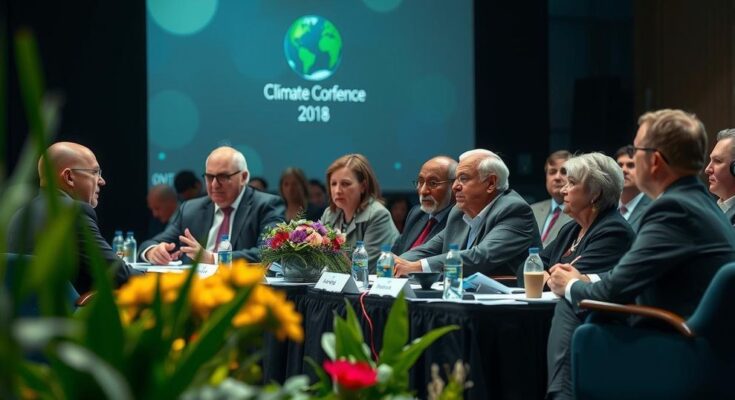COP29 witnessed a contentious negotiation over climate finance, culminating in a resolution that pledged only US$300 billion annually, significantly below the demanded US$1 trillion from developing nations. This inadequate framework has been criticized by delegates from India and Nigeria as insufficient for addressing the climate crisis. Procedural concerns raised during the conference highlighted a lack of inclusivity, leading to walkouts and increased skepticism of developed nations’ commitment to climate responsibilities ahead of COP30 in Brazil.
At COP29, the 29th United Nations Climate Change Conference, significant contention arose regarding the New Collective Quantified Goal (NCQG) climate fund designed for mitigating and adapting to climate impacts. Despite developing nations pushing for an annual funding target of US$1 trillion, the resolution set a meager commitment of only US$300 billion by developed nations until 2035. Delegates from India and Nigeria described the NCQG as insufficient and mere cosmetic responses to a colossal challenge. The negotiations noted a disturbing trend where developed nations appeared unwilling to adhere to the principle of common but differentiated responsibilities. Additionally, the underlying procedural issues and the rapid adoption of the NCQG raised concerns about transparency and inclusivity, prompting walkouts from two developing country alliances. As COP29 concluded, many expressed dismay over the resolution that failed to adequately address urgent climate finance needs. The future of meaningful international cooperation hinges on upcoming negotiations at COP30 in Belem, Brazil, where the divide between developed and developing nations must be addressed.
The COP29 conference was ostensibly centered on the need for a robust climate finance mechanism amid escalating global climate crises. Developing countries, who disproportionately bear the consequences of climate change yet historically contributed the least to its drivers, demanded substantial financial commitments from wealthier nations. The adopted NCQG tokenized these demands but fell severely short of expectations, underlining a persistent global inequity in climate action finance. Historical failures to meet previously established funding goals further complicate these discussions, raising questions about the commitment of developed nations to fulfill their obligations. An increasingly skeptical and divided negotiation environment threatens future climate action, necessitating clear steps towards meaningful collaboration by both developing and developed countries.
The outcomes of COP29 represent a critical setback in the global effort to combat climate change, demonstrating a troubling reluctance from developed nations to provide sufficient financial support to developing countries. The insufficiencies in the NCQG and the handling of negotiations have exacerbated existing inequalities and distrust. As nations prepare for COP30, there is a pressing need for genuine dialogue and action to ensure that funding directly targets the most vulnerable populations affected by climate change. Without meaningful commitments and a shift towards equitable financing practices, global climate goals remain at risk, jeopardizing the future of the planet.
Original Source: www.orfonline.org




